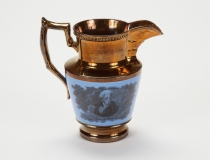The presidential election of 1828 was the first in which white male Americans who did not own property had the right to vote. This group’s new enfranchisement was expressed by the election of its champion: Andrew Jackson of Tennessee. Jackson had voiced the concerns of poor, everyday Americans four years earlier, but was denied the office despite receiving the plurality of the popular vote. This only fueled Jackson and his supporters to continue fighting, and Jackson spent the next four years campaigning against those he claimed were out of touch with everyday people.
Campaign souvenirs and memorabilia were not new to American elections, but they took on a newfound importance as more and more people were allowed to vote, and Jackson’s campaign knew this well. His supporters produced and marketed everyday items and tools, such as brooches, jacket buttons, wallets, and pitchers, to remind voters of Jackson’s appeal: he was a poor Southerner by birth, a war hero, a frontiersman, and a committed Democrat. This pitcher—copper cast with lusterware, small, not particularly ornate—features an engraving of the future president captioned “General Jackson: The Hero of New Orleans.”
Upon first glance, it seems like an average piece of kitchenware that I’d assume would be found in the home of an average American in the late 1820s, and this is likely intentional: people who would want or use this everyday item were Jackson’s voter base. The message that Jackson saved New Orleans from the British with a ragtag army made up of everyday Americans was one of Jackson’s most brilliant and effective campaign strategies. This perception contributed to the boom in Jackson-related memorabilia long after he had finished running for office.

